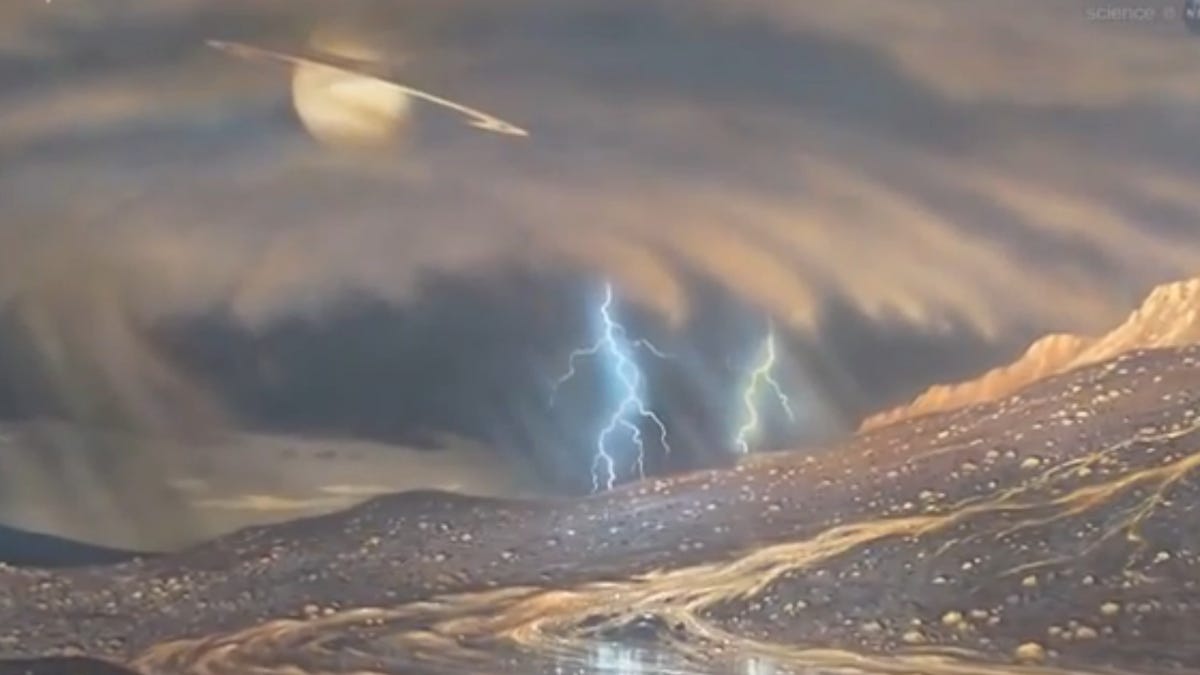Forget winter in Westeros, summer's coming to Titan
If you haven't heard of Titan, it just might be the most underrated place on our block, galactically speaking. Crave's Eric Mack has been getting reacquainted with Saturn's largest moon.

Thanks to my 5-year-old daughter (and, strangely enough, to "Game of Thrones"), I'm getting reacquainted with a place that seemed like magic when I first learned of it as a child myself -- Saturn's largest moon, the fascinating Earth-like satellite Titan.
Turns out that in the intervening two decades or so, scientists have learned quite a bit about this fascinating world covered with a fully developed atmosphere shielding a sheen of methane lakes on the surface below. Unlike the dead, dry rocks that pass for most other moons, Titan also hosts thunderstorms, running rivers, and perhaps even volcanoes spewing forth chunks of ice.
Now a team of astronomers led by Cornell University's Alex Hayes is looking forward to the coming (very gradual) change of the seasons on Titan to solve at least one of the myriad mysteries that have emerged about this strange satellite since humanity has become intimately more familiar with it in my adult years: the apparent lack of waves on the lakes.
As a child I remember being captivated by the thought that a world like Titan -- both alien and familiar at once -- was not only real, but relatively close by. And when my teachers and books (remember those?) told me back in the '80s that humanity could soon reach it, I was quite literally over the moon for Titan.
Roughly a decade later, as I was preparing to graduate high school, the Cassini spacecraft, which carried the European Space Agency's Huygens probe, was launched to explore Saturn and Titan. Another eight years on, in January 2005, Huygens landed on Titan's surface and returned photos of the far-flung moon, documenting dark rivers running down its hills into valleys.
I was too busy pretending to be an adult and somehow missed this event at the time, a crime that the 10-year-old me from 1989 would probably find inexcusable. But, for the last 15 years, after hardly thinking of the distant rock that once captivated me, I was reminded of the sense of wonder Titan inspires -- by, of all things, "Game of Thrones."
As it turns out, one of the theories floated online for why the weather cycles in the fictional world of Westeros are so long and inconsistent is that it exists on a planet with a long cycle of climatic change similar to the kind that shifts Titan's methane lakes over tens of thousands of years.
Of course, if you follow HBO's hit show closely, you'll recognize that this doesn't explain the inconsistent length of seasons on Westeros over the much shorter term.
But frankly, who cares about "Game of Thrones" right now with the latest season already over? We know "winter is coming" to Westeros, and by the time winter hits North America, it will still be coming. Meanwhile, something else exciting is slowly coming to the decidedly nonfiction world of Titan: summer.
Scientists studying data from Titan in recent years have been baffled by the aforementioned apparent lack of waves on its large lakes. One theory floated by Cornell's Hayes (a member of the Cassini radar team) is that we simply don't have enough observations of the moon's lake country during the summer, when more winds might be present to kick up some rough seas.
Like in fictional Westeros, the seasons can last for years on Titan (although much more consistently than they occur in George R.R. Martin's imagination), and now, as "Game of Thrones" fans still wait for winter, scientists excitedly anticipate the gradual emergence of summer on the wetter half of Saturn's largest satellite. Some astronomers think that by the time 2017 rolls around on Earth, it could be surf's up on Titan.
While science continues to search for more discoveries about the nature of Titan's mysteries, I've rediscovered that, at least for my family, Titan is a secret weapon for getting kids interested in science. After my daughter took an interest in the moon, stars, and planets, I gave her the lowdown on Titan.
Then, this past Fourth of July as we watched fireworks in the Southwestern sky, she pointed out pyrotechnics that resembled Jupiter's Red Spot, Saturn's rings, and Titan's "cow fart" methane rains (I never said we were a high-brow family). At a recent planetarium show, she was interested in seeing all the constellations, but was absolutely elated when the presenter mentioned Titan.
"It rains there!" she shouted to the darkened room.
In fact, she's now hoping to visit when she's an adult. So, if Elon Musk or the folks at NASA are reading, I've got the first name for your 2040 (wo)manned mission to Titan.
Watch the NASA video below to learn more about the mystery of Titan's waveless lakes.

